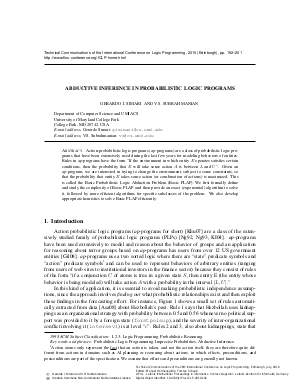Abductive Inference in Probabilistic Logic Programs
Authors Gerardo Simari, V.S. Subrahmanian
-
Part of:
Volume:
Technical Communications of the 26th International Conference on Logic Programming (ICLP 2010)
Part of: Series: Leibniz International Proceedings in Informatics (LIPIcs)
Part of: Conference: International Conference on Logic Programming (ICLP) - License:
 Creative Commons Attribution-NonCommercial-NoDerivs 3.0 Unported license
Creative Commons Attribution-NonCommercial-NoDerivs 3.0 Unported license
- Publication Date: 2010-06-25
File

PDF
LIPIcs.ICLP.2010.192.pdf
- Filesize: 407 kB
- 10 pages
Document Identifiers
Subject Classification
Keywords
- Probabilistic Logic Programming
- Imprecise Probabilities
- Abductive Inference
Metrics
- Access Statistics
-
Total Accesses (updated on a weekly basis)
0PDF Downloads0Metadata Views
Abstract
Action-probabilistic logic programs (ap-programs) are a class of probabilistic logic programs that have been extensively used during the last few years for modeling behaviors of entities. Rules in ap-programs have the form "If the environment in which entity E operates satisfies certain conditions, then the probability that E will take some action A is between L and U". Given an ap-program, we are interested in trying to change the environment, subject to some constraints, so that the probability that entity E takes some action (or combination of actions) is maximized. This is called the Basic Probabilistic Logic Abduction Problem (Basic PLAP). We first formally define and study the complexity of Basic PLAP and then provide an exact (exponential) algorithm to solve it, followed by more efficient algorithms for specific subclasses of the problem. We also develop appropriate heuristics to solve Basic PLAP efficiently.
Cite As Get BibTex
Gerardo Simari and V.S. Subrahmanian. Abductive Inference in Probabilistic Logic Programs. In Technical Communications of the 26th International Conference on Logic Programming. Leibniz International Proceedings in Informatics (LIPIcs), Volume 7, pp. 192-201, Schloss Dagstuhl – Leibniz-Zentrum für Informatik (2010)
https://doi.org/10.4230/LIPIcs.ICLP.2010.192
BibTex
@InProceedings{simari_et_al:LIPIcs.ICLP.2010.192,
author = {Simari, Gerardo and Subrahmanian, V.S.},
title = {{Abductive Inference in Probabilistic Logic Programs}},
booktitle = {Technical Communications of the 26th International Conference on Logic Programming},
pages = {192--201},
series = {Leibniz International Proceedings in Informatics (LIPIcs)},
ISBN = {978-3-939897-17-0},
ISSN = {1868-8969},
year = {2010},
volume = {7},
editor = {Hermenegildo, Manuel and Schaub, Torsten},
publisher = {Schloss Dagstuhl -- Leibniz-Zentrum f{\"u}r Informatik},
address = {Dagstuhl, Germany},
URL = {https://drops.dagstuhl.de/entities/document/10.4230/LIPIcs.ICLP.2010.192},
URN = {urn:nbn:de:0030-drops-25971},
doi = {10.4230/LIPIcs.ICLP.2010.192},
annote = {Keywords: Probabilistic Logic Programming, Imprecise Probabilities, Abductive Inference}
}
